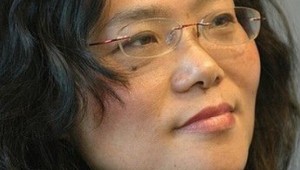
Author Zhang Lijia of the recently published Lotus: A Novel is a native from Nanjing, but writes in English. Writing in her chosen language makes her feel more free, she explains in an interview with Mengfei Chen of the LA Review of Books.
The LA Review of Books:
Interestingly, writing in English frees me literally as well. It frees me from any inhibition I may have: if I had written the novel in Chinese, I am sure the sex scene would be less explicit. Without the constraints, I can also be bold as I experiment with the language. Because English is not my native tongue, I use different words and I structure my sentences differently, consciously and unconsciously. Of course, my experiment doesn’t always work. But I enjoy the adventure.
The challenges are obvious. After diligently studying English for 30 years, I have yet to command the language completely. I write slowly, too slowly, in fact; I don’t understand the subtle meanings of certain words; and I am still confused by the use of the definite and indefinite article!
I find the relationship between the writer and the chosen language fascinating. I speak Chinese with a slight Nanjing accent. [NB: In many parts of China, this accent is viewed as a fairly déclassé one, definitely inferior to that of Beijing, where Zhang has long been based.] When speaking English, I’ve tried to cultivate a refined accent. [NB: She speaks English with what Americans might describe as a BBC accent.] Maybe there’s another reason that I went for English — it makes me feel more sophisticated than I actually am. I probably have not gotten rid of a sense of inferiority because of my worker’s background!
In addition to a romance and coming-of-age story, readers will be given insights to a full range of Chinese social issues, including corruption, taxation, educational inequities, rural to urban migration among others. How did you balance the desire and need to include explanatory information about China for readers who might not necessarily know very much about the country with the narrative and characters?
From the very beginning, I intended to use prostitution as an interesting window to observe the social tensions brought by the reforms and opening up. So I had to provide context to western readers who probably don’t know a great deal about China. In the earlier drafts, I often dumped too much information to a degree that it slowed the narrative drive. Also in earlier drafts, my writing in such parts tended to be journalistic. I cut back some background information – if a reader really wants to know more about certain aspect, he/she can easily Google it. I then sprinkled the necessary information and delivered it in a less journalistic way.
More in the LA Review of Books.
Zhang Lijia is a speaker at the China Speakers Bureau. Do you need her at your meeting or conference? Do get in touch or fill in our speakers´request form.
Are you interested in more stories by Zhang Lijia? Do check out this list.
